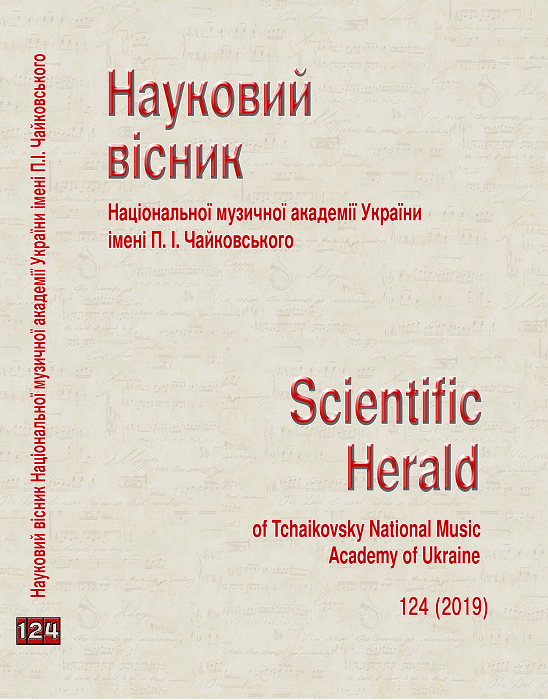Guitar creativity of Agustin Barrios in the context of the development of Paraguayan music
DOI:
https://doi.org/10.31318/2522-4190.2019.124.165413Keywords:
Paraguayan music, Agustin Barrios, guitarist-composer, Indian culture, Guarani, Saudad, “Cathedral”Abstract
The relevance of the article is the need to fill the shortage of research analytics, allowing to consider the composing and performing art of Agustín Barrios in the epicenter of the cultural context of the countries of the Latin American continent.
Main objectives of the article is to study the creative heritage of the Paraguayan virtuoso, to reveal its influence on the formation and development of Latin American composing and performing guitar art.
The methodology involves the use of historical, systemic, structural-functional methods (for a comprehensive analysis of historical events, studying of compositional, genre-stylistic and form-building elements of musical texture), comparative and phenomenological approaches (for comparing Latin American and European genre models, performing versions and extracting meaningful aspects of the studied works). The combination of these methods and approaches provides a wide panorama of the consideration of A. Barrios' creativity, in which major culturological generalizations are combined with genre-style and linguistic specificity of analytical material.
Results and conclusions. Agustin Barrios' guitar art is one of the first bright pages of Latin American music of the twentieth century. Archival audio recordings of his performances have become part of the historical foundation. The expansion of the technical arsenal of guitar performance, the creation of a large array of new music, included in the concert and competitive programs of our days, serve as the facts of the undeniable achievements of the Paraguayan musician. He opened to the world the sound silhouettes of his musical culture, its historical heritage and new possibilities. As one of the spokesmen for the aesthetics of indigenismo, Agustín Barrios captured the ritual traditions and mythology of the Guaraní indigenous peoples in his guitar work, revealed the beauty of hybrid genre models in Indian, Spanish-Portuguese and African-American musical fusions. He introduced the academic foundations that go back to the origins of the genre memory of European art, and formed in a new way a lively rhythm-intonational flow of the folk Latin American song-dance tradition, bringing it to the world guitar concert-academic scene.
Downloads
References
Docenko, V. (2010), History of Latin American music of XVI–XX centuries [Istorija muzyki Latinskoj Ameriki XVI-XX vekov]. Muzyka, Moscow, 368 p. [in Russian].
Zhovnir, S. (2018), The creativity of Agustin Barrios in the context of contemporary guitar art [Tvorchist Ahustyna Barriosa v konteksti suchasnoho hitarnoho mystetstva]. Actual questions of the humanities: interuniversity collection of scientific works of young scientists of the Ivan Franko State Pedagogical University of Drohobych [Aktualni pytannia humanitarnykh nauk: mizhvuzivskyi zbirnyk naukovykh prats molodykh vchenykh Drohobytskoho derzhavnoho pedahohichnoho universytetu imeni Ivana Franka], Drohobych: Vydavnychyi dim «Helvetyka», 2018, vol. 19, no. 2, рp. 31–35 [in Ukrainian].
Larchenko, R.-M. and Uspenskij, K. (2013), Creative activity of Agustin Barrios in the context of Latin American musical culture [Tvorcheskaja dejatel'nost' Agustina Barriosa v kontekste latinoamerikanskoj muzykal'noj kul'tury]. Aesthetic education: tradition and modernity: Materials II mizhfak. stud. nauk.V-Ex. Conf., Minsk, December 12; Bel. state. ped. Univ named after M. Tank; the Editorial:. T.S Bogdanova, T.D Syarnova, V.A Vassilevich et al. [Jestjetychnaja adukacyja: tradycyi i suchasnasc': matjeryjaly II mizhfak. stud. navuk.-prakt. kanf., Minsk, 12 snezh; Bel. dzjarzh. ped. un-t imja M. Tanka; rjedkal.: T. S. Bagdanava, T. V. Sjarnova, U. A. Vasilevich i in.], BDPU, Minsk, 2014, Available from: http://gitara.by/page/tvorcheskaya-deyatelnost-agustina-barriosa-statia.aspx (Accessed: 12 Dec. 2018) [in Russian].
Machneva, U. (2006), Augustine Barrios: "Mercy in the Name of the Lord" [Avgustin Barrios: "Milost' vo imja Gospodne"], Available from: http://abateguitar.narod.ru/A_g_article8.htm (Accessed: 07 Dec. 2018) [in Russian].
Rodionov, V. (2013), Musical Guitar 25. Agustin Barrios [Gitara muzykal'naja 25. Agustin Barrios], Available from: https://www.proza.ru/2013/05/29/1952 (Accessed: 22 Oct. 2018) [in Russian].
Benites, J. (ed.), (1977), Agustin Barrios Mangoré: Complete works [Obras completas], Tokyo : Zen-on music company, Vol. 1, 60 p. [in Spanish].
Benites, J. (ed.), (1977), Agustin Barrios Mangoré: Complete works [Obras completas], Tokyo : Zen-on music company, Vol. 4, 68 p. [in Spanish].
Boettner, M. (2000), Music and Musicians of Paraguay [Música y Músicos del Paraguay], in Paraguayan Associated Authors (eds.). Asunción, 215 p. [in Spanish].
Godoy, S. and Szaran, L. (1994), Mangoré, Life and Work of Agustin Barrios [Mangoré, Vida y Obra de Agustin Barrios], Asunción : Editorial Nanduti, 94 p. [in Spanish].
Hoke, J.(2013), The guitar recordings of Agustin Barrios Mangoré: an analysis of selected works performed by the composer : Doctoral’s thesis, Tallahassee: The Florida State University College of music, 2013. 101 p. Available from: https://diginole.lib.fsu.edu/islandora/object/fsu:185073/datastream/PDF/view (Accessed: 08 Dec. 2018) [in English].
Stover, R. (1992), Six silver moonbeams: the life and times of Agustin Barrios Mangoré. Clovis, CA : Querico Publications, 271 p. [in English].
Stover, R. (1995), Agustin Barrios Mangoré: His Life and Music, Part IV: Discussion and Analysis, Guitar Review, no. 101 (Spring), рp. 17–28 [in English].
Ward, A. M. (2010), Agustin Barrios Mangoré: a study in the articulation of cultural identity, The Elder conservatorium of music, The university of Adelaide, Adelaide,192 p., Available from: https://digital.library.adelaide.edu.au/dspace/bitstream/2440/61957/9/01-front.pdf (Accessed: 09 Dec. 2018) [in English].
Downloads
Published
How to Cite
Issue
Section
License
Our journal abides by the CREATIVE COMMONS copyright rights and permissions for open access journals.
Authors, who are published in this journal, agree to the following conditions:
The authors reserve the right to authorship of the work and pass the first publication right of this work to the journal under the terms of a Creative Commons Attribution License, which allows others to freely distribute the published research with the obligatory reference to the authors of the original work and the first publication of the work in this journal.
The authors have the right to conclude separate supplement agreements that relate to non-exclusive work distribution in the form in which it has been published by the journal (for example, to upload the work to the online storage of the journal or publish it as part of a monograph), provided that the reference to the first publication of the work in this journal is included.




